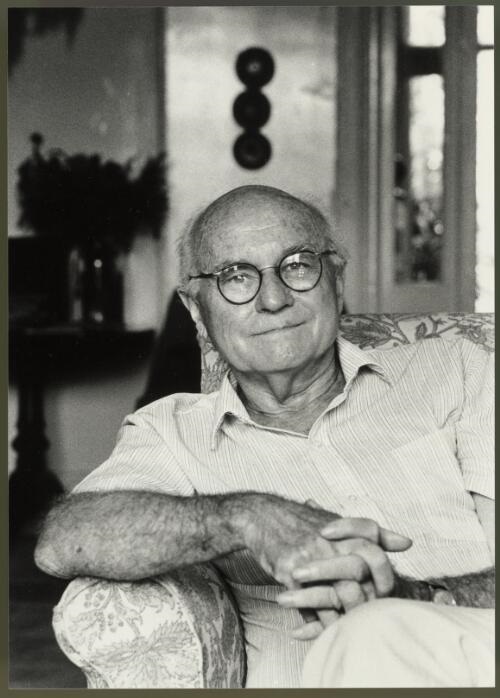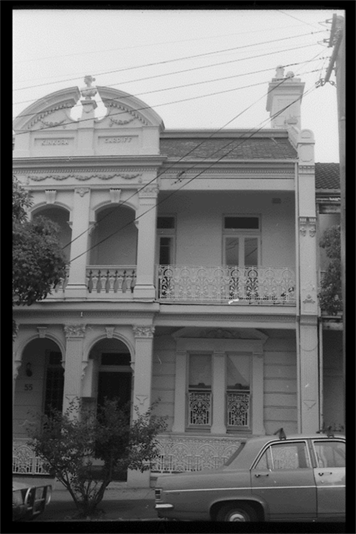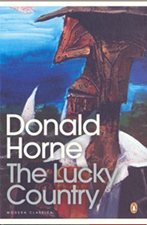Donald Richmond Horne AO

Donald Richmond Horne AO
Donald Horne (1921-2005) is one of Australia's foremost public intellectuals and authors. His book The Lucky Country (first published in 1964 and now in its 6th edition) continues to be discussed and cited in commentary about Australia's cultural and political life.

Portrait of Donald Horne, Woollahra, 1987, Alec Bolton, National Library of Australia PIC P2192/142-143,361 LOC Album 933/B.
A plaque commemorating Donald Horne was unveiled on 1 April 2025 by the Mayor of Woollahra, Clr Sarah Swan in the presence of Donald and Myfanwy Horne's children, Julia and Nick Horne. The guest speakers were Professor Julia Horne and Nick Horne.
Plaque location
The plaque is located in the footpath outside 'Cardiff', 53 Grosvenor Street, Woollahra.
View all plaques in Woollahra
Plaque Unveiling Gallery
Julian Svehla, Angela Raymond, Julia Horne, Julius Pucci, Stephen Garton, Louise Mitchell, Mayor Sarah Swan, Sandra Forbes, Gil Appleton, Helen Pringle and Angela Bowne gather around the plaque for Donald Horne.
(JPG, 1MB)
Early life
Donald Horne was born to David and Florence (nee Carpenter) Horne, in Kogarah, Sydney, on Boxing Day, 1921. When he was five years old, the family moved to Muswellbrook, N.S.W., where his father had taken a position as teacher at the local primary school, the Muswellbrook District Rural School, and where Donald also attended as a pupil. He showed an early interest in reading and a curiosity which he expressed in later life as a 'great desire that I would really like to know everything'.[1]
In 1933, a year after Donald had started high school in Maitland, the Education Department transferred his father to a school in Westmead and the Horne family began a new life in Sydney. This precipitated a decline in David Horne's mental health and after several years of becoming increasingly anxious, 'tense' and taciturn, he was forced to retire from teaching. During this difficult period, when Donald was 15 years old, his younger sister, Janet, was born. For the adolescent Donald, these two events had 'an unusually large disruptive effect on [his] life'.[2]
By the time he graduated from high school, life for Donald had stabilised and in 1939 he enrolled in a Bachelor of Arts at the University of Sydney. At university, Donald's world expanded and his 'imagination burst with all the enormous changes that occurred.'[3]
Following in the footsteps of his father and uncles, Donald joined the Australian army in 1941. However, due to a training accident, he spent much of his war service in Darwin before being accepted in 1944 for a diplomatic cadetship based in Canberra.
Journalist and editor
As a university student Donald became interested in student politics, which saw him accept the role of honorary editor of the student newspaper, Honi Soit, in 1941. As a young 20 year old, he scored a paid job as a journalist with the Daily Telegraph. In 1944 after his stint with the army, he returned to journalism, writing again for the Daily Telegraph while pursuing a diplomatic career in Canberra. In 1945 he was released from his diplomatic cadetship and was employed on a permanent basis by the Daily Telegraph.
In 1948, Donald married his first wife Ethel Nora Orr and they moved to England in 1949. He intended to become a novelist, and he continued writing as a journalist on London's Fleet Street. In 1954 he accepted the offer of a job from Frank Packer as editor of a new publication the Weekend and returned to Australia.
In 1958 Packer offered Horne the editorship of a new intellectual publication The Observer, as recompense for this successful stewardship of the Weekend. Horne remained editor of The Observer until it was 'replaced' by the Bulleting, which Packer bought in 1961. One of Horne's first actions as editor was to remove the long-standing masthead 'Australia for the White Man'. Typically, he did not seek Frank Packer's approval for this.[4] Horne was editor of The Bulletin from 1961-1962 and 1967-1972. During the intervening years he worked as a creative director in an advertising agency and was co-editor of Quadrant from 1963-1966.
Family life
Donald married Myfanwy Jane Gollan (1933-2013) in 1960 after a brief courtship. Although she was twelve years younger than Donald, they had much in common as Myfanwy also worked as a journalist, writer and editor and shared Donald's intellectual curiosity. Myfanwy edited all of Donald's books and was a constant emotional and intellectual support to him.
After their married, Donald and Myfanwy rented part of 'Greyholme', a 1920s two-storey house on the corner of Manning Road and Wallaroy Crescent, Double Bay.[5] In the small garden outside their flat, Donald discussed his ideas with Myfanwy, and the notes he made in a writing pad balanced on his knee evolved into his first and most significant book: The Lucky Country.
In 1966, after the birth of their two children, Julia and Nick, the family moved to Cardiff, 53 Grosvenor Street, Woollahra. Horne described himself as 'a bit Italian', in the sense that his first loyalty was to his family. When he wasn't writing, he could be found folding the laundry, unstacking the dishwasher or making breakfast.[6]

'Cardiff' 53 Grosvenor Street, Woollahra. From the Bondi Junction Field Survey, 1982. Woollahra Libraries Digital Archive.
Writer
Horne's writing style was clear, engaging and accessible. This enabled him to distil and expound ideas to a wide audience. In December 1964 he published The Lucky Country, which became one of the most popular and influential books in Australia in the 20th century. Qantas provided copies on their aircraft so that passengers could read for themselves its oft quoted line: 'Australia is a lucky country run by second-rate people who share its luck'.[7]
Horne shot to fame with countless radio, television and newspaper interviews in 1965. The book was a searing social critique of contemporary Australian society. It warned against complacency and questions established attitudes while urging Australians to value intelligence, imagination, and innovation as a means to fulfil the country's potential. The Lucky Country has sold over 100,000 copies and has never been out of print.
The title of Horne's most enduring book, The Lucky Country, remains widely recognised as short-hand for 'Australia', even by those who don't know the origins of the phrase, or those who know its origins but may not appreciate the central irony of its premise - a conundrum foreseen by Horne before publication.
During his lifetime, Horne wrote 24 books ranging from political and social commentary to history, memoir, satire and fiction. He also contributed to or edited a further 20 books. His final book, 10 Steps to a More Tolerant Australia, was published to critical acclaim in 2003 when he was 82 years old.

Front cover of 'The Lucky Country', 1964, Penguin Books (image painting by Albert Tucker)
Academic and teacher
In 1973, after his resignation from The Bulleting the previous year, Horne accepted the offer of a temporary research fellowship in political science at the University of NSW. This was a gamble for the university, as Horne did not have any formal academic qualifications, having never completed his Bachelor of Arts. The gamble paid off. The fellowship gave Horne the scope to research and write without the strictures of journalistic deadlines and formats. The following year he was appointed to a continuing academic position in the school of political science, where he continued to work until 1986.
Horne was Chair of the Faculty of Arts from 1982 to 1986 and a member of the university's council from 1983 to 1986. He was made Emeritus Professor just before he retired from the University in 1986.[8] In 1992, Horne was appointed Chancellor of the University of Canberra, serving until 1995.
Cultural activities
Horne was a passionate advocate for the arts, arguing that the arts must become a quintessential part of an Australian way of life. in 1985 he was appointed Chair of the Australia Council (renamed Creative Australia in 2023), a position he held until 1991. During his chairmanship he was typically hands-on and enthusiastic, writing articles, promoting policies, and giving speeches and interviews that supported and recognised the importance of the arts. He also made time to travel to many regional galleries, museums and arts centres to consult and show his support. On his death in 2005, the chief executive of the Australia Council, Jennifer Bott, acknowledged Horne's commitment to the Australia Council, as someone who 'always advocated for an independent intellectual and artistic life for our country' and who was 'a champion for the development of Australian cultural policy and identity'.[9]
Donald Horne was also Chair of Ideas for Australia (1991-1994); Chair of the Copyright Agency Limited; President of the Australian Society of Authors (1984-1985), a member of the NSW Centenary of Federation Committee, and founder of Arts Action Australia 1989.[10]
At a more local level, and as evidence of his hands on and supportive approach to community cultural events, Donald Horne was the keynote speaker at the Woollahra Bicentenary Debating Competition held at Woollahra Council in 1988.

Donald Horne, 1992, image courtesy of National Film and Sound Archive of Australia
Political interests
With the publication of The Lucky Country, Horne's commitment to an Australian Republic grew and both he and Myfanwy were active in constitutional reform movements. Horne advocated for the modernisation of Australia's constitution and parliament (electoral reform and fixed parliaments) to more adequately reflect the changing times.[11]
Horne was a member of the Australian Constitutional Commission from 1985 to 1988 and co-founder of the Australian Republican Movement in 1991. He was appointed as a member of the Australian Citizenship Council (with the aim of providing advice to Government on contemporary issues relating to Australian citizenship) when it was formed in 1998.[12]
Honours and awards
- Horne was awarded Officer of the Order of Australia on 14 June 1982 for Service to Literature.[13]
- In 1997 he was named as one of Australia's Living Treasures - the year the award was established by the National Trust of Australia (NSW). This award is granted to people who have made an outstanding contribution to Australian society.[14]
- On 1 January 2001 he was awarded the Centenary Medal for Service to the Centenary of Federation celebrations in New South Wales.[15]
- He was conferred with a number of honorary degrees including:
- University of New South Wales - Doctor of Letters, 1986
- Griffith University - Honorary Doctorate, for distinguished contributions to the humanities and social sciences in Australia, 1990
- University of Canberra - Honorary Doctorate, 1996
- University of Sydney - Doctor of Letters, 2005
- Horne was named 2002 Humanist of the Year by the Council of Australian Humanist Societies, 'in recognition of his outstanding contribution to humanism is action and a social critic and commentator on Australian society for more than fifty years. In particular for his strong advocacy of liberal democracy, multiculturalism, tolerance, republicanism and the recognition of indigenes as Australia's first people.'[16]
- In 2011 a plaque in his honour as an Australian writer was installed in the Sydney Writer's Walk, an initiative of the NSW State Government in 1991.[17]
- He is an inductee in the Australian Media Hall of Fame.[18]
- He is an inductee in the Muswellbrook Shire Hall of Fame.[19]
Legacy
- The Donald Horne Cultural and Creative Fellows at the University of Canberra provides funding to recent graduates of the doctoral program who were members of the Centre for Creative and Cultural Research.[20]
- In 2016 The Saturday Paper established The Horne Prize for essay writing named in honour of Donald Horne in recognition of his contribution to Australian literature and academia.
- The Donald and Myfanwy Horne Room, which opened at the State Library NSW in 2018, contains the books, desk and chair from Donald Horne's study in his Woollahra home. Here, they inspire future generations of research who use the Room as part of their State Library of NSW Research Fellowships.[21]
- The Donald Horne Prize for 'the best performance in the Politics, Philosophy and Economics program' at University of NSW, School of Humanities and Languages.
- His archive is held at the State Library of NSW.
- In 2023, a building in the Muswellbrook Innovation Precinct was opened and named in his honour.
- Horne's books continue to be read, discussed and debated by scholars and members of the public alike:
- In 2024, on the 60th anniversary of the publication of The Lucky Country, the Australian Academy of Humanities held a symposium, "The ideas & ideals of Australia: The Lucky Country turns sixty".[22]
- In 2024, the Australian Studies Institute at the Australian National University held the Fifth Annual Australia & the World Symposium: "Still Lucky? 60 years since Donald Horne's scathing critique".[23]
- The 2024 annual lecture of the Australian Academy of Humanities focused on the chapter of Horne's book about Australia and Asia - a recording and transcript of "Australians - the aristocrats of Asia?" by Emeritus Professor Louise Edwards FAHA FASSA FHKAH, is available.[24]
List of books
- The Lucky Country, 1964
- The Permit, 1965
- The Education of Young Donald, 1967
- God is an Englishman, [1969]
- The Next Australia, [1970]
- But what if there are no pelicans
- The Australian People: biography of a nation, 1972
- Money made us, 1976
- Death of the Lucky Country, 1976
- In Search of Billy Hughes, 1979
- Time of hope: Australia, 1966-1972, 1980
- Winner take all, 1981
- The Great museum: the re-presentation of history, 1984
- Confessions of a new boy, 1986
- Portrait of an optimist, 1988
- Ideas for a nation, 1989
- The Coming Republic, 1992 (et al)
- The Trouble with economic rationalism, 1992 (ed.)
- The Intelligent tourist, 1992
- An Interrupted life, 1998
- Into the open: memoirs 1958-1999, 2000
- Looking for leadership: Australia in the Howard years, 2001
- Ten steps to a more tolerant Australia, 2003
- Dying: A memoir, 2007, by Donald and Myfanwy Horne
- Donald Horne: Selected writings, 2017 (edited by Nick Horne)
Sources
[1] National Film and Sound Archive, Australian Biography: Donald Horne, Transcript of an interview with Robin Hughes, 16 January 1992
[2] National Film and Sound Archive, Australian Biography: Donald Horne, Transcript of an interview with Robin Hughes, 16 January 1992
[3] National Film and Sound Archive, Australian Biography: Donald Horne, Transcript of an interview with Robin Hughes, 16 January 1992
[4] 'Forever misquoted, Donald Horne dies', Sydney Morning Herald, 9 September, 2005
[5] Horne, Julia, 'An Armchair, a desk and 4000 books: the Horne family study gets a second life', The Conversation, 24 May 2018
[6] Cropp, Ryan, Donald Horne: A Life in the Lucky Country, La Trobe University Press, 2023, p. 282
[7] Cropp, Ryan, Donald Horne: A Life in the Lucky Country, La Trobe University Press, 2023, p. 159
[8] Horne, Julia, 'An Armchair, a desk and 4000 books: the Horne family study gets a second life', The Conversation, 24 May 2018
[9] 'Australia Council mourns the passing of Donald Horne AO', Creative Australia
[10] University of Sydney, 'Citation: Emeritus Professor Donald Richmond Horne AO', 2005
[11] 'Goodbye Donald', Australasian Parliamentary Review, Spring 2005, Vol. 20 (2)
[12] 'Australian Citizenship Council announced', Media release 7 Aug 1998
[13] Australian Honours Search Facility, Australian Government, Dept. of the Prime Minister and Cabinet
[14] Australian National Living Treasure, Austlist
[15] Australian Honours Search Facility, Australian Government, Dept. of the Prime Minister and Cabinet
[16] Australian Humanist of the Year, CAHS
[17] Sydney Writers Walk, Wikipedia
[18] Australian Media Hall of Fame
[19] Muswellbrook Shire Hall of Fame
[20] University of Canberra, Donald Horne Creative and Cultural Fellows
[21] Horne, Julia, 'An Armchair, a desk and 4000 books: the Horne family study gets a second life', The Conversation, 24 May 2018
[22] Australian Academy of Humanities, 'The ideas & ideals of Australia: The Lucky Country turns sixty'
[23] Australian National University, 2024, The Fifth Annual Australia & the World Symposium: Still Lucky? 60 years since Donald Horne's scathing critique
[24] Emeritus Professor Louise Edwards, 'Australians - the aristocrats of Asia?'